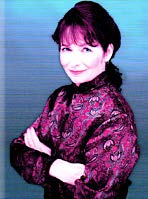Do I miss performing in concert, composing music, working with the symphonies and playing music with some of the most extraordinarily talented musicians I've known? Yes. The road I chose became one of isolation, following what beckoned me to look closer, and understand more about children with special needs.
THE CHOICE I MADE
BY PATTY CARLSON
This is a story of an unusual set of circumstances that brought me into your life and the lives of so many families with children who need help. The story is not about me, though by necessity, I am writing it. This story is about you and how much you truly mean to me. I began to play the piano when I was twenty one. My goal was to compose and produce music for films. I still recall emphatic lectures from friends and family. "It's not possible, Patty. Everyone knows you would have had to start to learn music at a very young age and have exceptional talent."
I was determined. Listening to music, I thought, it just can't be that hard. I taught myself, memorizing musical phrases in songs, using the piano to find the sequence of tones used to compose the music. I understood music as a mathematical language of structural form and motion, the expression of ideas and feelings through tones. By the time I was thirty, I was composing and producing music for Marty Stouffer's PBS "Wild America" series, ABC Mutual of Omaha films and films broadcast on TBS.
Producing quality music scores is expensive. Budgets were tight. Between film production schedules, I began teaching piano. My first student was an eleven year old boy. I explained the simplicity of the language of music. I introduced him to the primary tonal "alphabet", the seven basic forms of music vocabulary, multiple choices of hand motions to play the vocabulary across the piano keyboard, and how a simple numeric sequence would influence the emotional content of the music.
Two weeks later he returned playing his first composition. He performed fluently from one end of the piano to the other. An impressive composition, having never played before. Clearly he understood my instruction.
Living in Aspen, Colorado, my reputation as a piano teacher spread rapidly among celebrity community members. ABC news interviewed me about my methods of teaching. I appeared on Turner Broadcasting Systems "Looking Up" show. Hollywood producers wanted to film my lessons. "Play the Piano Overnight" was launched, voted "Best Music Instruction" by Billboard Magazine. I appeared in a half hour infomercial which aired internationally for almost three years. I made multiple appearances on Home Shopping Network, multiple appearances on BBC's "Dini Petty Show," the Home Show, CBS News, WGN Radio interviews in Chicago. I was performing in concert, and producing film scores at Fantasy Films Recording Studios in Berkeley.
An unanticipated turning point in my career happened quite by accident, or destiny, one might wonder. I was collaborating with Barbi Benton on a song. I was writing the music. She was writing the lyrics. One day she was at my house wanting to know how she could continue working on the project since she had to leave for Los Angeles. I asked her if she had a piano. "Yes" she replied, "but I don't know how to play it." I said, "Sit down and I'll show you how to play the piano." Visibly annoyed, she said "Patty, I only have 20 minutes before I have to go." I said "Sit down. I only need fifteen." Twenty minutes later, she left. Two days later, my phone started ringing. It was Barbi. "I have to see you. I have to see you again before I leave for L.A." "Barbi," I said looking at the clock, "it's five o'clock in the morning. We had a snow storm last night. You can't get down my driveway." "I don't care!" she said. "I have to see you again before I leave."

KEYS TO PROGRESS: Occasionally, real breakthroughs happen when someone from outside of professional doctrine brings new information to the research.
Six o'clock in the morning, I Searching for an answer, I concentrated on analyzing what I watched Barbi Benton and her husband climb over a barbed wire fence across the pasture and hike through knee deep snow on their way to my house. Entering through the front door, Barbi was ecstatic. "You have to hear what I did with what you taught me!". I wasn't entirely sharing her enthusiasm. Two days ago she couldn't play the piano at all. I started towards the kitchen to make coffee. Barbi walked directly to my piano, sat down and began to play. The moment she started, I literally froze. I could not believe what I was hearing. The music was magnificent, complex, sophisticated, beautiful, an extraordinary composition. It wasn't rational to believe twenty minutes of piano instruction studied over the course of two days could possibly have created that music. There had to be a way to understand how, or why the information I gave Barbi produced that result.
Searching for an answer, I concentrated on analyzing what I taught versus conventional music education. The two programs were totally different. The foundation of knowledge I built my program on had no reasonable comparison to how music was taught in traditional music education. I applied for and was granted a US Patent for a unique method of conveying musical information.
I started a "Development Case Study" program seeking to understand how the information I was teaching produced what I suspected was similar to an acquired savant result. Filmed testimonies were abundant from people of multiple ages thrilled with their new found talent. Rapid results achieved in fluent piano performance ability was consistent but hadn't revealed the answer I was looking for, until the day I interviewed Tracy Williams, seven year old Adam's mother.
During a filmed session, Tracy asked if she could talk about something that happened at her son's school. Adam began studying my program while he was in kindergarten. He had been studying once a week from January through the summer. The end of kindergarten, Adam's teacher told Tracy that Adam's handwriting was the absolute worst in his class. He ran all of his lines together. She really needed to work with him to get his handwriting better. Tracy, a working mother, hadn't been able to work with Adam at all. The following school year, the first thing the new teacher told her was Adam's handwriting was beautiful. It was the most beautiful hand writing she'd ever seen, especially for a boy. Tracy was thrilled, and went to tell the teacher from the previous year. He didn't believe her. They went to the office to compare Adam's papers.
He could not believe what he was seeing, how beautiful Adam's handwriting was. Checking other papers, he asked Tracy "Did you see this?" Adam's tests indicated he was reading at a fifth grade, third month level. The only difference in Adam's everyday routine was studying the Numeric Language of Music program with me.
I'd heard of research indicating there was a relationship between the study of a musical instrument and the brain. Taking music lessons in childhood was believed to be a significant predictor of a higher IQ in young adulthood and better high school grades, but Adam had advanced from a first grade reading level to a fifth grade, third month level. What caused his handwriting skills to develop to near perfection?
Documenting academic results in other students studying the program became a priority. Sixteen year old Stephanie advanced from D- to 98% in math. Fifteen year old Jennifer improved from completely failing math to a B. Sixteen year old Megan was failing math, non social, wasn't participating in class at all, had been placed in the Response to Intervention program, without success, and was recommended to be placed on prescription drugs. Desperate for help, the family contacted me. Five weeks after starting the program Megan had 100% in math and joined the basketball team. Researching neuroscience articles about the relationship between music and the brain, I became hopeful my program had potential to help people suffering from Alzheimer's disease. I tested the program with three individuals residing at a local assisted living center. One resident had advanced Alzheimer's, one had advanced Parkinsons and the third had suffered a disability for over ten years due to a stroke. The resident brain injury specialist monitored the progress of the program over several months time. "I was stunned" she said in a filmed interview. Symptoms reversed in all three cases.
The program I tested at the assisted living center included only the basic components of the Numeric Language of Music. If I documented the exact steps I was using in an instructional manual, would the program produce similar results? In August of 2019, Martha, our local postmaster, told me her grandson was on the autism spectrum. Did I think the program would help him, she asked. As always, I would only say what the program has done, not what the program can or will do. That being said, so far I don't know what it can't do. I would be inclined to believe that yes, it was very possible.
Martha's youngest grandson Cale, was three years old. He was diagnosed with Childhood Apraxia of Speech. Her oldest grandson, Kaden, was eleven. Kaden was falling far behind in school performing at a third grade level starting fifth grade. I gave Martha the instructional program I had written. The program was easy to use, a simple numeric system of tonal sequences to be played on a piano keyboard.
Martha and the boy's mother, Shannon, taught the boys the tonal sequences I provided in the manual. Kaden was older, and quickly advanced to the Piano Logic program he studied on DVD. Three months later, I received a letter from Shannon. Cale's speech had improved 70%. His teachers were no longer frustrated as now they could understand his needs. Even a stranger would be able to understand him. Martha said now she could understand everything her grandson was saying. Kaden's reading scores advanced from a 3.4 reading level to a 5.8 reading level. Kaden's math teacher told them he has never seen a student improve in math so quickly, he was so impressed.
"We can't thank you enough" Martha wrote. "You have discovered something AMAZING with the piano and I am so thankful you have and are pursuing it." Only later did I learn there was no known cure for CAS. Most children never overcome it.
Do I miss performing in concert, composing music, working with the symphonies and playing music with some of the most extraordinarily talented musicians I've known? Yes. The road I chose became one of isolation, following what beckoned me to look closer, understand more about the Numeric Language of Music® I was teaching and how the program was reversing previously perceived impossibilities in children on the Autism Spectrum, with children with Special Needs struggling with math and reading and with advanced neurodegenerative diseases including Alzheimer's and Parkinson's disease. That is why this story is not about me. It's about you. You, your children, and every person's life this program helps are absolutely worth the choice I made.•
ABOUT THE AUTHOR:

Patty Carlson is a predominantly self taught film score composer and producer, recording artist, concert pianist, celebrity music educator and professional lecturer and developer of the Numeric Language of Music program. Learn more at pianoforspecialneeds.org